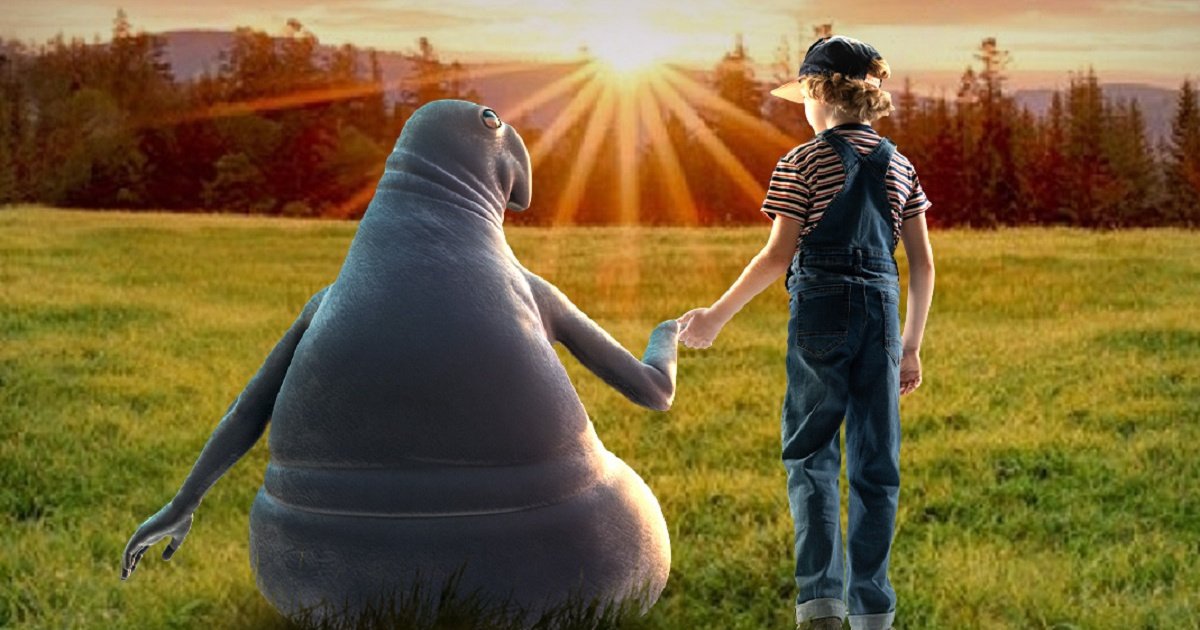On March 18th, a press screening of the family film “Zhdun” took place, with the public premiere scheduled for March 20th. We went to the cinema to see if the movie managed to bring back the famous Zhdun meme. Here’s our review to tell you what the film is like and whether it’s worth taking your children to or watching yourself.
An ordinary family lives in a fancy mansion in Abrau-Durso. The husband works at a science startup center, the wife stays at home ordering new kitchens or family sea trips, and their children – an adventurous boy Nikita and his clever sister – just hang out and relax by the pool. It’s vacation time! Everything is just like everyone else’s, basically. Oh, and there’s also a grandfather who, after his wife’s death, decided to isolate himself and live separately in a cozy shed near the mansion.
One day, a meteorite of alien origin falls to Earth. Bad guys are sent to find it, tasked with getting innovative technologies, but Nikita gets there first. He accidentally finds Zhdun and his ship in the reeds. Nikita and Zhdun quickly become friends and decide to team up to help Zhdun return home. To do this, they need to fix the “Flyer,” from which the “antigravity device” fell out, which was taken by the head of the science startup center corporation. That’s pretty much it. And traditionally, for this to happen, the Semenov family needs to solve internal and external problems, unite, and become closer to each other. Like in a fairy tale.
Perhaps one of the biggest and most terrible problems with this film is that it is very difficult to believe in. Even if you really want to, even (perhaps) if you watch it from a child’s perspective. It feels fake in so many details, inconsistencies, and character reactions. It’s like seeing a dream with a trickster who seems like your friend, but suddenly you notice him wearing a watch not on his wrist, but on his ankle. At that moment, you realize that something is definitely wrong with him, that he is lying to you, even though you hoped to become friends. It’s the same with “Zhdun”: a creepily smiling mother supposedly pours tea for her husband, but due to a montage error, no tea comes out of the teapot. Or, for example, there is a scene where the grandfather meets the boy and Zhdun in the reeds, and the reeds are lit with such infernal light, as if you are looking at 3D pictures in a magazine through red-green glasses. One thought comes to mind: “This is all unreal, they are lying to you, run, Zhdun.” Or here’s another: a girl feeds poor Zhdun lemons, and he sucks them in like a vacuum cleaner. And it doesn’t matter that it looks more like ancient Chinese torture, the main thing is that she is having fun.
The narratives and themes of the film themselves are false. Take, for example, the mother of the main character Nikita: she seems to be a kind woman who does nothing bad, but with her actions, she deliberately pushes her husband into debt. And the father? He has two children, a wife, and an unemployed grandfather to support. At one point, he himself loses his job due to the evil head of the startup, but instead of actually looking for a job, he plays detective, tracking down his own relatives. Even in the key plot about Zhdun, there are inconsistencies: the whole family reacts so normally to the alien that it seems like they saw some awkward distant relative. It’s as if they themselves are strange Zhduns, and he is the only normal one. This feeling persists because of the “unreality” of their lives – a million questions arise about how many children live in fancy mansions in Abrau-Durso, so that they have many toys, a private pool, and panoramic windows. And regardless of the moment, the refrigerator is always full. If the authors wanted to make fun of stereotypes a little, they managed to fall into the deepest uncanny valley.
Everything else, as you might guess, meets a certain standard. The protagonist family’s plot arc is about working through old traumas and finding common ground again, and the antagonists’ arc is about understanding that greed is bad and you need to respect other people. A classic story that is supposed to teach young viewers something.
Regarding humor, everything is complicated here because sometimes you smile yourself, and sometimes even the children in the audience remain in dead silence. They are not as stupid as they seem, they perfectly distinguish toilet humor from something really good. By the way, about something good: there is a feeling that the creators of this miracle deliberately left a subtle reference to Disco Elysium, because who else discovers amazing intelligent beings in the reeds?
In general, your humble servant, unfortunately, could not withstand the oppressive feeling of emptiness and left the hall before the film came to its logical conclusion. Therefore, there will be no spoilers regarding whether poor Zhdun returned from this terrible fake planet to his home planet. The first emotion after leaving the hall was absolute anger, which then grew into sadness and acceptance. Perhaps such films are needed for something. If only to understand the average temperature in the hospital of filmmakers wishing to escape from painful reality.

